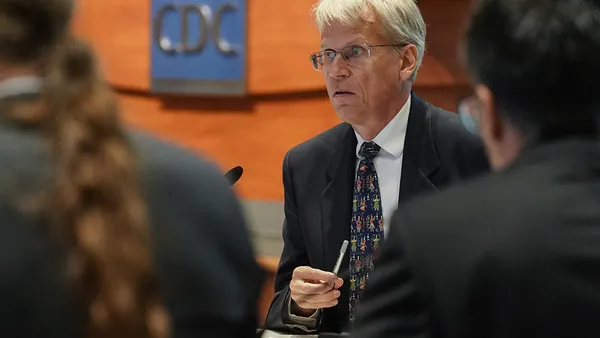When hospital wards filled up during the pandemic, pulse oximeters, which measure the amount of oxygen in the blood, became a go-to method for discerning who needed higher levels of care. It took years of fighting COVID-19 before a pivotal study emerged showing that the devices were not giving accurate readings for darker-skinned patients — a disparity that researchers at John Hopkins University said delayed treatment for people of color.
Why were the devices inaccurate? Researchers suggest that too many pulse oximeters were originally tested on — and were calibrated for — white patients.
The pulse oximeter disparity is just one of many that have lingered in healthcare for decades. Novartis is aiming to tackle these challenges with an ambitious plan to unearth and address the root causes of health inequities. Launched a little over a year ago, the 10-year program is now on track to hit key milestones — and it’s expanding.
As part of the plan, Novartis has teamed up with the Novartis U.S. Foundation and 26 historically Black colleges, universities, medical schools and organizations to “create great diversity, equity and inclusion across the research and development ecosystem.”
“The race correction issue is the biggest disservice we’ve done in the practice of medicine in the U.S. and globally."

Dr. Patrice Matchaba
President, Novartis U.S. Foundation
The plan, called Beacon of Hope, is multifaceted. To lay the groundwork for more diversity in clinical trials, Novartis U.S. Foundation pledged approximately $13.7 million to launch three digitally enabled research centers at Morehouse School of Medicine, with the aim of creating a model for clinical trial excellence that could be replicated at other Black medical schools.
Recognizing these new sites should be staffed with diverse employees, Novartis U.S. Foundation also committed $20 million to “help prepare up to 1,200 Black and African American students to become the next generation of leaders in health, science, technology and business in collaboration with Thurgood Marshall College Fund.”
The other two key areas of the project comprise researching and validating existing data standards to “drive diagnosis, clinical trial endpoints and population health policy to identify areas for increased inclusivity” and addressing solutions related to “environmental and climate issues” that impact people of color.
The magic of the approach

Novartis is, of course, one of many large pharma companies embarking on major projects aimed at boosting diversity and inclusion efforts. What makes this approach unique is its emphasis on collaboration and co-creation, said Dr. Patrice Matchaba, president, Novartis U.S. Foundation.
“Four historically black medical schools have agreed to work together on clinical trials, as opposed to saying all the work goes to one school,” Matchaba explained.
The other aspect of Beacon of Hope that Matchaba said could have a major impact on the industry is its efforts to build diversity among site investigators to create more trust in communities of color.
“There’s no trust in the community,” he said. “At the same time, when you look at the FDA database of clinical trials, sometimes there are zero investigators from these communities. So how do you recruit patients? That’s why we’re developing these programs. That’s the magical piece.”
So far, Matchaba said the program is on track with its goals and has announced its first cohort of 120 students from various disciplines who will receive scholarships for their education. Novartis will mentor the students directly so that the company can “prepare them to get into the industry or stay in academia — and (help) build trust in innovation,” Matchaba said.
In June, Beacon of Hope announced that Novartis is committing an additional $17.7 million to found the Clinical Trial Centers of Excellence at Howard University College of Medicine, Meharry Medical College and Charles R. Drew University of Medicine and Science — “bringing total planned grants to $50 million over 10 years,” the company said in a statement. Merck & Co. and Sanofi have also joined the program to run trials through the new centers.
In addition to targeting systemic issues facing the Black community, Matchaba noted that the program will pave the way to better care for women and other communities experiencing inequalities.
And when another pandemic strikes, Matchaba hopes these steps will build the trust needed to improve outcomes for people of color.
“There will be another pandemic. But people have to trust the innovations … so we don’t have a situation like we did this time with vaccine hesitancy,” he said.
A Center for Excellence created in collaboration with Morehouse School of Medicine will also examine race correction issues in health care — similar to the problem of inaccurate pulse oximeters.
“The race correction issue is the biggest disservice we’ve done in the practice of medicine in the U.S. and globally,” he said.












